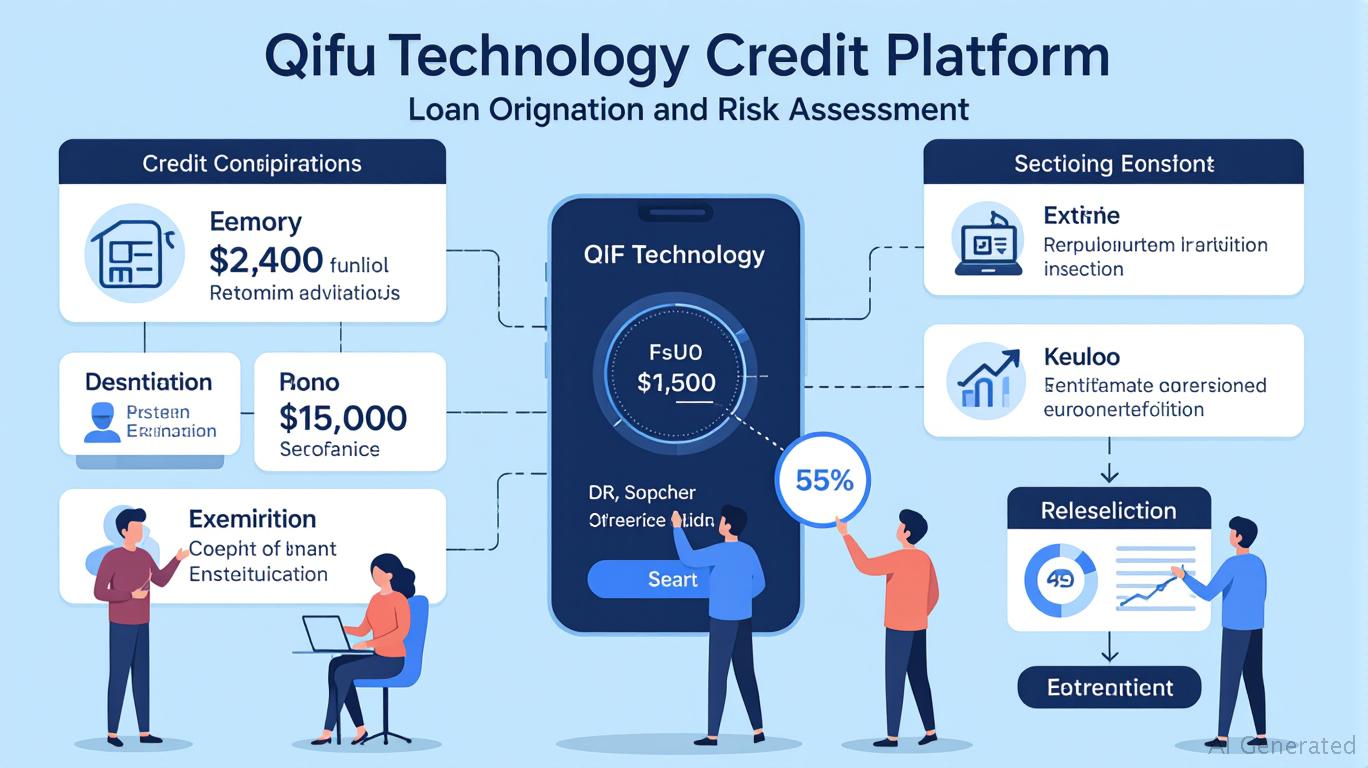Julian WestTuesday, Jul 8, 2025 7:40 am ET
![]() 4min read
4min read
In an era where artificial intelligence (AI) is reshaping global finance, Qifu Technology, Inc. (NASDAQ: QFIN) stands out as a pioneer in leveraging AI to transform credit services. The company's AI-Plus credit strategy has driven measurable improvements in operational efficiency, risk mitigation, and valuation multiples, positioning it as a compelling investment in China's competitive fintech landscape. With loan volume growth of 15.8% year-over-year (YoY), a stable delinquency rate of 2.02%, and a 30-basis-point decline in funding costs, Qifu is proving that AI integration can create sustainable value. Let's dissect the mechanics of its success and why its stock remains undervalued.

Operational Efficiency: Scaling with Smarter Technology
Qifu's AI-Plus platform optimizes every step of its credit lifecycle. In Q1 2025, total loan facilitation volume reached RMB88.88 billion, a 15.8% YoY increase, despite a modest sequential dip. The capital-light model—where Qifu acts as a technology solutions provider rather than a direct lender—now accounts for 49.3% of total loans. This shift reduces capital requirements and operational risk, enabling faster scaling.
The AI-driven underwriting process slashes approval times and lowers costs. For instance, funding costs fell 22% YoY to RMB122.7 million in Q1 2025, driven by cheaper ABS issuances and a record US$690 million convertible bond offering. The company's blended funding costs are now among the lowest in its peer group, thanks to AI's ability to match borrowers with institutional partners efficiently.
Risk Mitigation: Balancing Growth and Stability
While loan growth is robust, Qifu's risk management framework ensures it doesn't overextend. Its 90-day delinquency rate of 2.02% as of March 2025 is within historical norms, despite macroeconomic headwinds. Key metrics like the 30-day collection rate (88.1%) and repeat borrower retention (95.1%) signal strong borrower loyalty and effective recovery protocols.
The AI system's real-time monitoring of creditworthiness and behavioral data allows proactive adjustments. For example, the Day-1 delinquency rate of 5.0%—a metric tracking immediate defaults—remains within targeted ranges, indicating that risk is being identified early. This balance between growth and prudence has kept investor confidence intact, even as hedge funds like Mirae Asset Global Investments boosted holdings by over 10,812%.
Valuation: A Buying Opportunity at 5.58x Forward P/E
Qifu's financial metrics align with its valuation, which remains attractively low. Its forward P/E of 5.58 is half the industry average, and its PEG ratio of 0.54 suggests earnings growth is outpacing valuation. The Zacks Rank #2 (Buy) and Value Score of "A" reflect these advantages.
The company's 25% surge in ABS issuance in Q1 2025 further underscores its capital efficiency. By securitizing loans into ABS, Qifu reduces reliance on traditional bank financing and lowers interest expenses—a strategy that will likely fuel margins in coming quarters.
Investment Thesis: A Rare Combination of Growth and Value
Qifu's AI-Plus model addresses two critical challenges in fintech: cost control and risk management. With 24-31% YoY net income growth expected in Q2 2025, the company is proving that scale and profitability can coexist. Meanwhile, its valuation metrics—particularly the P/E and P/B ratios—signal undervaluation relative to peers.
The stock's low volatility and strong institutional support (despite mixed hedge fund activity) make it a safer bet in a volatile market. Investors seeking exposure to China's credit-tech sector should note that Qifu's dominance in AI-driven solutions and its prudent financial stewardship position it to capitalize on long-term growth trends.
Risks to Consider
No investment is risk-free. Qifu faces headwinds like tariff-related economic uncertainty and competition from legacy banks. However, its AI platform's adaptability and cost advantages mitigate these risks. A sudden spike in delinquency rates or regulatory crackdowns could pressure margins, but current trends suggest management is prepared for such scenarios.
Final Verdict: A Strategic Buy
Qifu Technology's AI-Driven Credit Strategy isn't just a buzzword—it's a blueprint for sustainable growth. With a compelling valuation, strong fundamentals, and a clear path to expanding its technology-driven footprint, QFIN offers a rare blend of upside potential and safety. For income-focused investors, its consistent net income growth and share repurchase program add further appeal.
In a market where overvaluation is rampant, Qifu's undervalued status makes it a standout opportunity. For now, the AI-Plus model is not just driving efficiency—it's driving shareholder returns.
Investors are advised to monitor Q2 2025 results for confirmation of guidance and track macroeconomic developments in China's credit sector.








 English (US) ·
English (US) ·